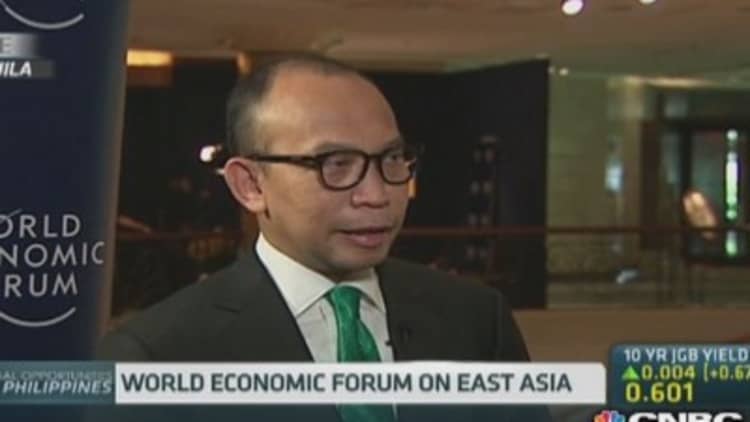
One year on from the start of last year's taper tantrum, Indonesian Finance Minister Chatib Basri told CNBC his country will inevitably see an exodus of capital once the Federal Reserve begins tightening monetary policy.
Emerging markets were hit hard last year after U.S. central bankers first broached tapering the Fed's massive quantitative easing program which had helped fuel risk appetite since 2008. Indonesia was among the most badly bruised given its high current account deficit; its currency lost 26 percent over the year.
Read MoreIndia and Indonesia: Not so bad after all?
Basri told CNBC that his country is in a better position now, but noted a change in Fed policy would still have an impact.
"Like it or not there will be the possibility of capital outflows," he said.
"I think it'll be contained but... there'll be a reaction from the market, because once the U.S. raises the interest rate, people will be looking for returns," he added, noting he doesn't believe the situation will be as bad as 2007.
Basri said the best way for Indonesia to approach the situation is to minimize the impact "by providing good macroeconomic stability, following the policy, continuing with the tightening cycle." He expects the Fed to rate hikes in the latter half of 2015.
Read MoreIndonesia Finance Minister: No deficit issue in 2014
Indonesian authorities have already taken huge strides towards protecting the economy from further shocks including cutting fuel subsidies by 44 percent and raising interest rates 175 basis points since mid-2013.
Basri told CNBC the Indonesian rupiah's resilience in January when the Argentine peso's 30 percent drop prompted panic selling across many emerging market currencies was testament to the hard work authorities had done to protect the economy against external shocks.
"I think the central bank has made a good move by maintaining the interest rate at this level even though inflation is subdued...on the fiscal side we continue to tighten...so by doing this I think Indonesia can maintain macro-economic stability," he added.
As the July presidential elections fast approach, some industry watchers are concerned that the reform agenda may lose steam.
Jakarta's current governor Koko Widodo - widely known as Jokowi - is believed to be the presidential favorite. But if Widodo doesn't garner enough votes, he may need to form a coalition with another party, which could limit his ability to push through reforms.
But Chatib Basri told CNBC he's confident the reforms that had already been made would be maintained.
"In a country like Indonesia we cannot continue to grow by 7 percent without being an open economy and being friendly to foreign capital," he added.
Read MoreCan Indonesia's economy catch a break?
Although Indonesia has helped shore up the rupiah's losses through tighter monetary policy - the currency has recovered 5 percent this year - growth has suffered as a result. Indonesia's economy expanded 5.2 percent on year in the first quarter, missing analyst expectations of 5.6 percent.
However, Basri strongly disagreed with the idea of loosening monetary policy again.
"No, no, no. We'll continue with the counter cyclical [measures], both on the fiscal side and the monetary side until we reach a current account deficit of 2.5 to 3 percent," he said.
Indonesia's current account deficit was 2.06 percent of gross domestic product in the first quarter of this year.

